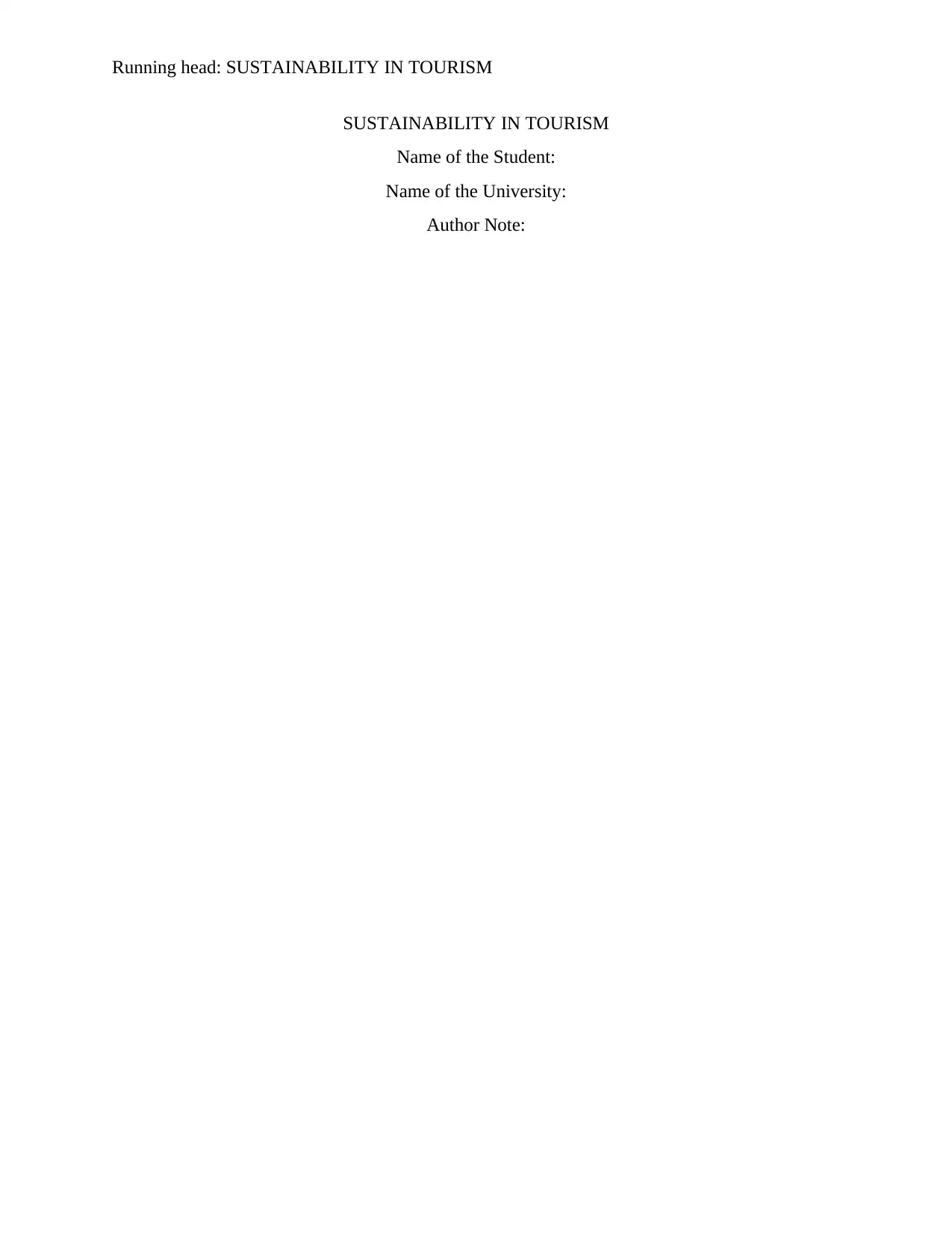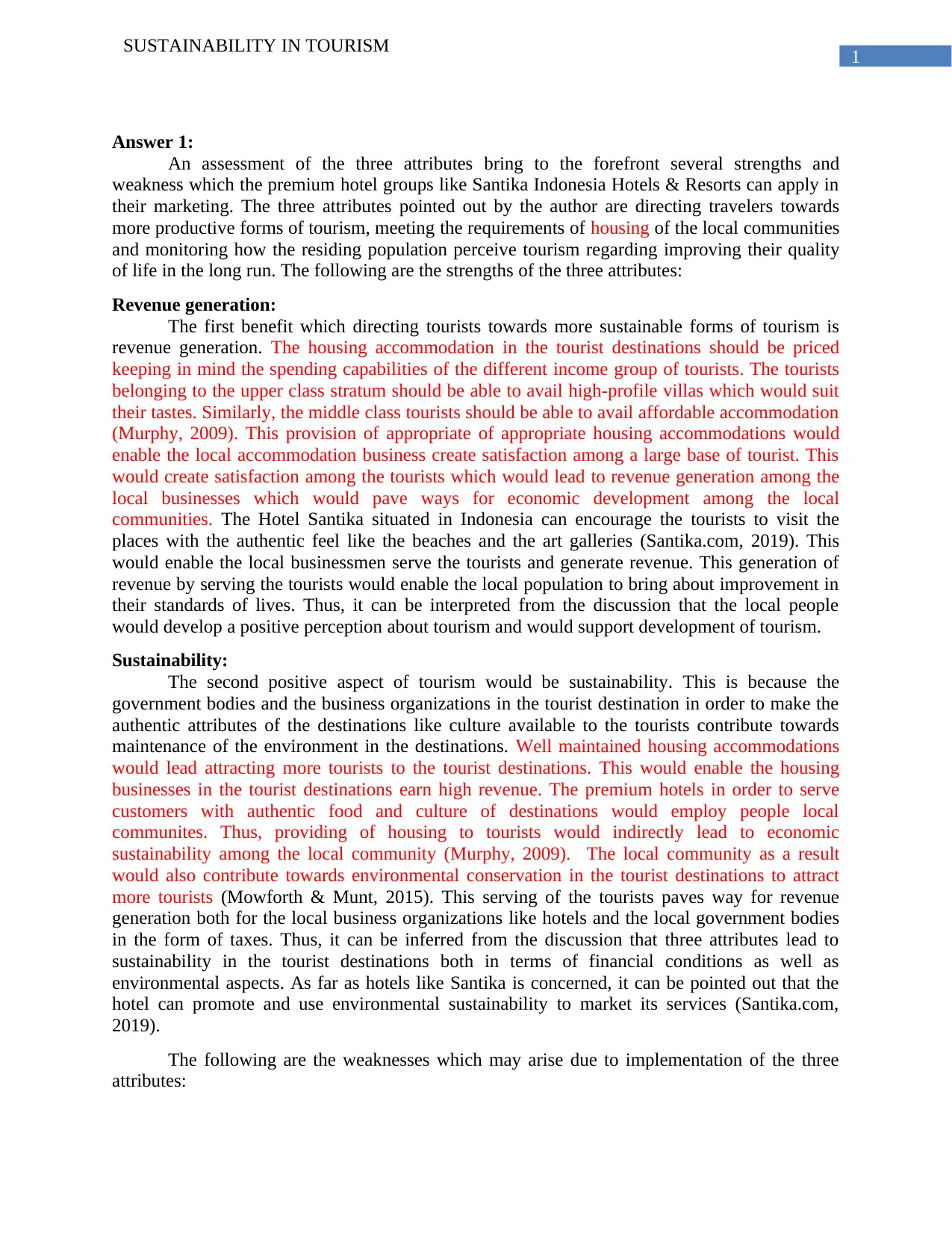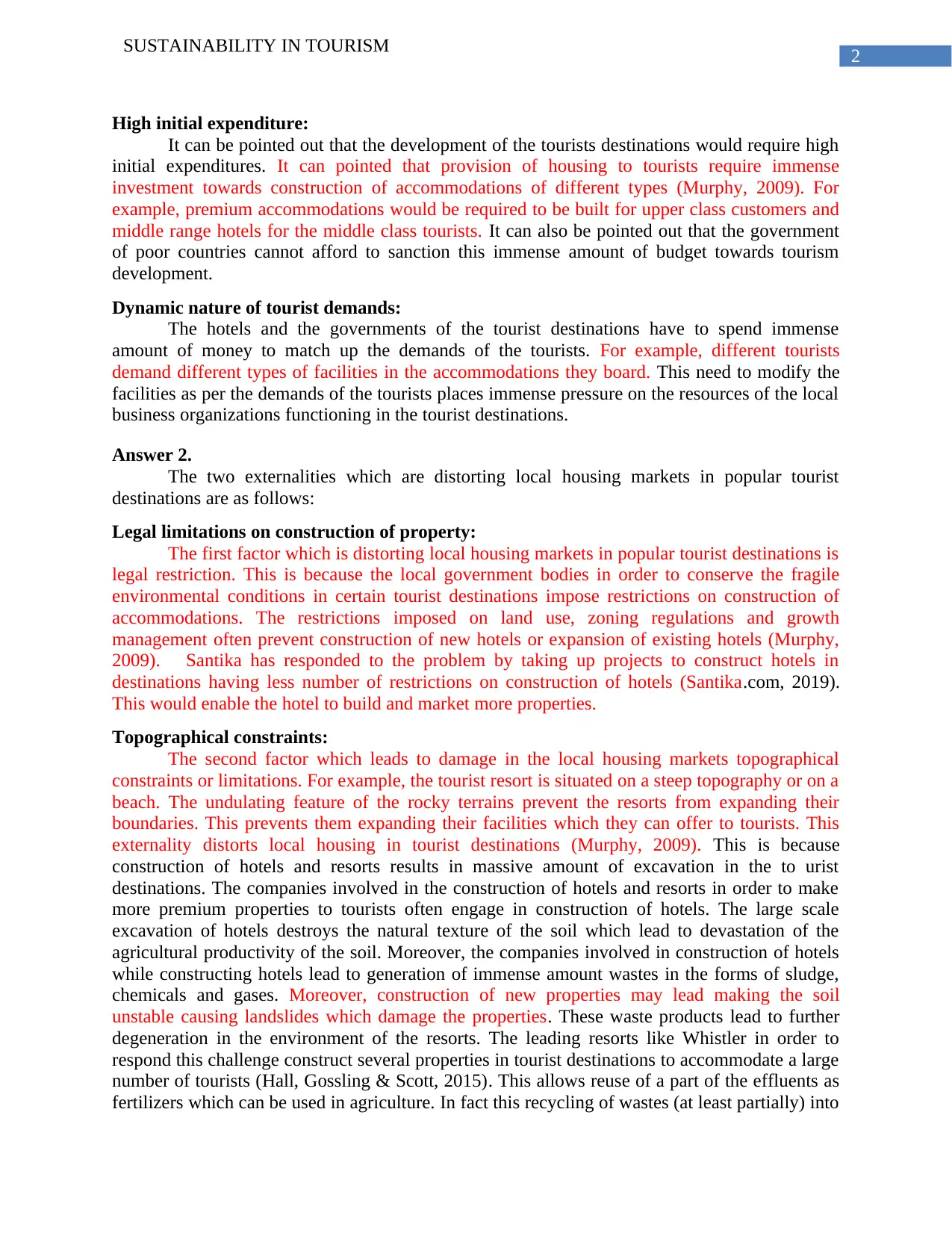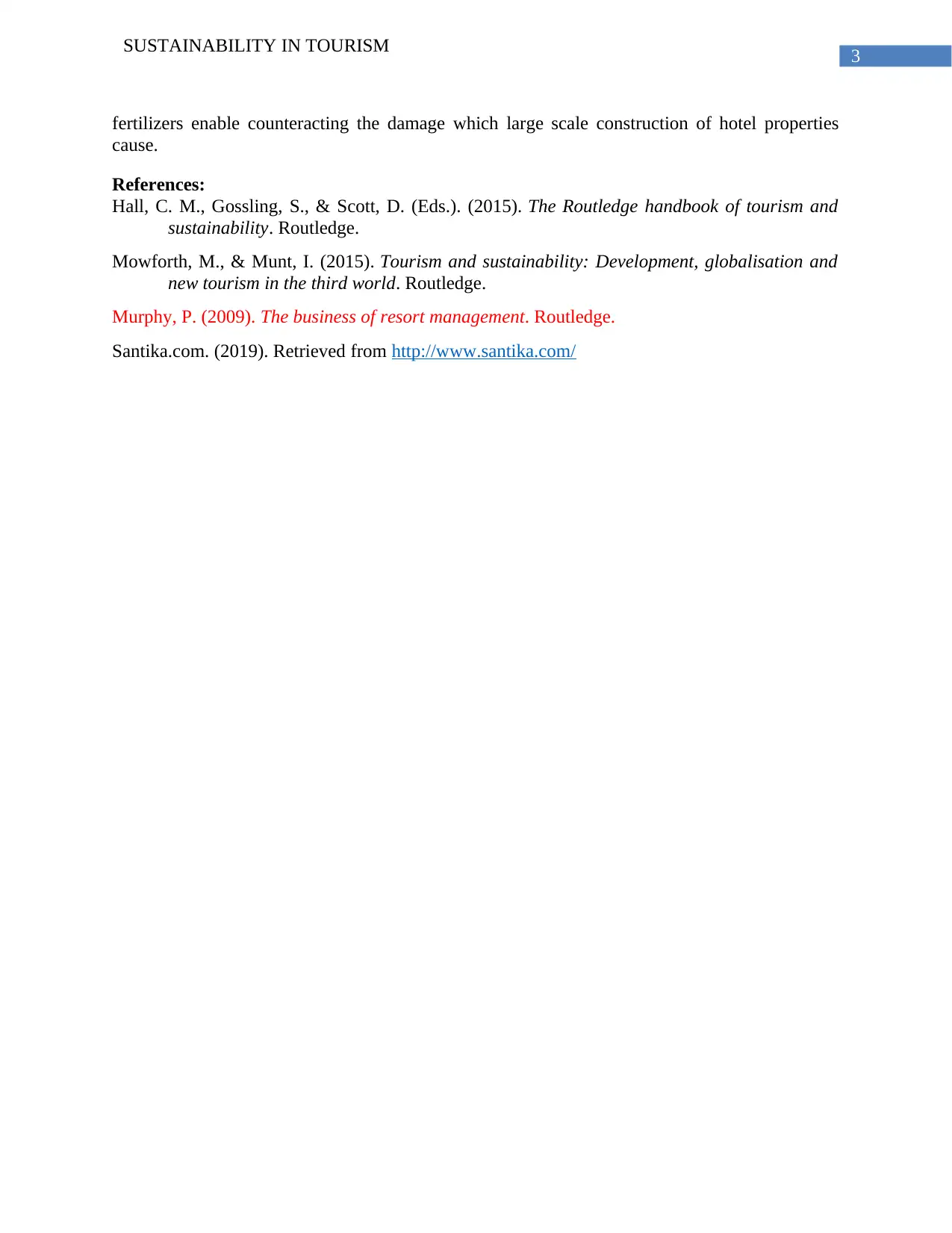Sustainability in Tourism
VerifiedAdded on 2023/01/20
|4
|1310
|98
AI Summary
This document discusses the attributes of sustainability in tourism, including revenue generation and environmental conservation. It also explores the strengths and weaknesses of implementing these attributes in popular tourist destinations. The case study focuses on Santika Indonesia Hotels & Resorts and their efforts to promote sustainable tourism.
Contribute Materials
Your contribution can guide someone’s learning journey. Share your
documents today.

Running head: SUSTAINABILITY IN TOURISM
SUSTAINABILITY IN TOURISM
Name of the Student:
Name of the University:
Author Note:
SUSTAINABILITY IN TOURISM
Name of the Student:
Name of the University:
Author Note:
Secure Best Marks with AI Grader
Need help grading? Try our AI Grader for instant feedback on your assignments.

1
SUSTAINABILITY IN TOURISM
Answer 1:
An assessment of the three attributes bring to the forefront several strengths and
weakness which the premium hotel groups like Santika Indonesia Hotels & Resorts can apply in
their marketing. The three attributes pointed out by the author are directing travelers towards
more productive forms of tourism, meeting the requirements of housing of the local communities
and monitoring how the residing population perceive tourism regarding improving their quality
of life in the long run. The following are the strengths of the three attributes:
Revenue generation:
The first benefit which directing tourists towards more sustainable forms of tourism is
revenue generation. The housing accommodation in the tourist destinations should be priced
keeping in mind the spending capabilities of the different income group of tourists. The tourists
belonging to the upper class stratum should be able to avail high-profile villas which would suit
their tastes. Similarly, the middle class tourists should be able to avail affordable accommodation
(Murphy, 2009). This provision of appropriate of appropriate housing accommodations would
enable the local accommodation business create satisfaction among a large base of tourist. This
would create satisfaction among the tourists which would lead to revenue generation among the
local businesses which would pave ways for economic development among the local
communities. The Hotel Santika situated in Indonesia can encourage the tourists to visit the
places with the authentic feel like the beaches and the art galleries (Santika.com, 2019). This
would enable the local businessmen serve the tourists and generate revenue. This generation of
revenue by serving the tourists would enable the local population to bring about improvement in
their standards of lives. Thus, it can be interpreted from the discussion that the local people
would develop a positive perception about tourism and would support development of tourism.
Sustainability:
The second positive aspect of tourism would be sustainability. This is because the
government bodies and the business organizations in the tourist destination in order to make the
authentic attributes of the destinations like culture available to the tourists contribute towards
maintenance of the environment in the destinations. Well maintained housing accommodations
would lead attracting more tourists to the tourist destinations. This would enable the housing
businesses in the tourist destinations earn high revenue. The premium hotels in order to serve
customers with authentic food and culture of destinations would employ people local
communites. Thus, providing of housing to tourists would indirectly lead to economic
sustainability among the local community (Murphy, 2009). The local community as a result
would also contribute towards environmental conservation in the tourist destinations to attract
more tourists (Mowforth & Munt, 2015). This serving of the tourists paves way for revenue
generation both for the local business organizations like hotels and the local government bodies
in the form of taxes. Thus, it can be inferred from the discussion that three attributes lead to
sustainability in the tourist destinations both in terms of financial conditions as well as
environmental aspects. As far as hotels like Santika is concerned, it can be pointed out that the
hotel can promote and use environmental sustainability to market its services (Santika.com,
2019).
The following are the weaknesses which may arise due to implementation of the three
attributes:
SUSTAINABILITY IN TOURISM
Answer 1:
An assessment of the three attributes bring to the forefront several strengths and
weakness which the premium hotel groups like Santika Indonesia Hotels & Resorts can apply in
their marketing. The three attributes pointed out by the author are directing travelers towards
more productive forms of tourism, meeting the requirements of housing of the local communities
and monitoring how the residing population perceive tourism regarding improving their quality
of life in the long run. The following are the strengths of the three attributes:
Revenue generation:
The first benefit which directing tourists towards more sustainable forms of tourism is
revenue generation. The housing accommodation in the tourist destinations should be priced
keeping in mind the spending capabilities of the different income group of tourists. The tourists
belonging to the upper class stratum should be able to avail high-profile villas which would suit
their tastes. Similarly, the middle class tourists should be able to avail affordable accommodation
(Murphy, 2009). This provision of appropriate of appropriate housing accommodations would
enable the local accommodation business create satisfaction among a large base of tourist. This
would create satisfaction among the tourists which would lead to revenue generation among the
local businesses which would pave ways for economic development among the local
communities. The Hotel Santika situated in Indonesia can encourage the tourists to visit the
places with the authentic feel like the beaches and the art galleries (Santika.com, 2019). This
would enable the local businessmen serve the tourists and generate revenue. This generation of
revenue by serving the tourists would enable the local population to bring about improvement in
their standards of lives. Thus, it can be interpreted from the discussion that the local people
would develop a positive perception about tourism and would support development of tourism.
Sustainability:
The second positive aspect of tourism would be sustainability. This is because the
government bodies and the business organizations in the tourist destination in order to make the
authentic attributes of the destinations like culture available to the tourists contribute towards
maintenance of the environment in the destinations. Well maintained housing accommodations
would lead attracting more tourists to the tourist destinations. This would enable the housing
businesses in the tourist destinations earn high revenue. The premium hotels in order to serve
customers with authentic food and culture of destinations would employ people local
communites. Thus, providing of housing to tourists would indirectly lead to economic
sustainability among the local community (Murphy, 2009). The local community as a result
would also contribute towards environmental conservation in the tourist destinations to attract
more tourists (Mowforth & Munt, 2015). This serving of the tourists paves way for revenue
generation both for the local business organizations like hotels and the local government bodies
in the form of taxes. Thus, it can be inferred from the discussion that three attributes lead to
sustainability in the tourist destinations both in terms of financial conditions as well as
environmental aspects. As far as hotels like Santika is concerned, it can be pointed out that the
hotel can promote and use environmental sustainability to market its services (Santika.com,
2019).
The following are the weaknesses which may arise due to implementation of the three
attributes:

2
SUSTAINABILITY IN TOURISM
High initial expenditure:
It can be pointed out that the development of the tourists destinations would require high
initial expenditures. It can pointed that provision of housing to tourists require immense
investment towards construction of accommodations of different types (Murphy, 2009). For
example, premium accommodations would be required to be built for upper class customers and
middle range hotels for the middle class tourists. It can also be pointed out that the government
of poor countries cannot afford to sanction this immense amount of budget towards tourism
development.
Dynamic nature of tourist demands:
The hotels and the governments of the tourist destinations have to spend immense
amount of money to match up the demands of the tourists. For example, different tourists
demand different types of facilities in the accommodations they board. This need to modify the
facilities as per the demands of the tourists places immense pressure on the resources of the local
business organizations functioning in the tourist destinations.
Answer 2.
The two externalities which are distorting local housing markets in popular tourist
destinations are as follows:
Legal limitations on construction of property:
The first factor which is distorting local housing markets in popular tourist destinations is
legal restriction. This is because the local government bodies in order to conserve the fragile
environmental conditions in certain tourist destinations impose restrictions on construction of
accommodations. The restrictions imposed on land use, zoning regulations and growth
management often prevent construction of new hotels or expansion of existing hotels (Murphy,
2009). Santika has responded to the problem by taking up projects to construct hotels in
destinations having less number of restrictions on construction of hotels (Santika.com, 2019).
This would enable the hotel to build and market more properties.
Topographical constraints:
The second factor which leads to damage in the local housing markets topographical
constraints or limitations. For example, the tourist resort is situated on a steep topography or on a
beach. The undulating feature of the rocky terrains prevent the resorts from expanding their
boundaries. This prevents them expanding their facilities which they can offer to tourists. This
externality distorts local housing in tourist destinations (Murphy, 2009). This is because
construction of hotels and resorts results in massive amount of excavation in the to urist
destinations. The companies involved in the construction of hotels and resorts in order to make
more premium properties to tourists often engage in construction of hotels. The large scale
excavation of hotels destroys the natural texture of the soil which lead to devastation of the
agricultural productivity of the soil. Moreover, the companies involved in construction of hotels
while constructing hotels lead to generation of immense amount wastes in the forms of sludge,
chemicals and gases. Moreover, construction of new properties may lead making the soil
unstable causing landslides which damage the properties. These waste products lead to further
degeneration in the environment of the resorts. The leading resorts like Whistler in order to
respond this challenge construct several properties in tourist destinations to accommodate a large
number of tourists (Hall, Gossling & Scott, 2015). This allows reuse of a part of the effluents as
fertilizers which can be used in agriculture. In fact this recycling of wastes (at least partially) into
SUSTAINABILITY IN TOURISM
High initial expenditure:
It can be pointed out that the development of the tourists destinations would require high
initial expenditures. It can pointed that provision of housing to tourists require immense
investment towards construction of accommodations of different types (Murphy, 2009). For
example, premium accommodations would be required to be built for upper class customers and
middle range hotels for the middle class tourists. It can also be pointed out that the government
of poor countries cannot afford to sanction this immense amount of budget towards tourism
development.
Dynamic nature of tourist demands:
The hotels and the governments of the tourist destinations have to spend immense
amount of money to match up the demands of the tourists. For example, different tourists
demand different types of facilities in the accommodations they board. This need to modify the
facilities as per the demands of the tourists places immense pressure on the resources of the local
business organizations functioning in the tourist destinations.
Answer 2.
The two externalities which are distorting local housing markets in popular tourist
destinations are as follows:
Legal limitations on construction of property:
The first factor which is distorting local housing markets in popular tourist destinations is
legal restriction. This is because the local government bodies in order to conserve the fragile
environmental conditions in certain tourist destinations impose restrictions on construction of
accommodations. The restrictions imposed on land use, zoning regulations and growth
management often prevent construction of new hotels or expansion of existing hotels (Murphy,
2009). Santika has responded to the problem by taking up projects to construct hotels in
destinations having less number of restrictions on construction of hotels (Santika.com, 2019).
This would enable the hotel to build and market more properties.
Topographical constraints:
The second factor which leads to damage in the local housing markets topographical
constraints or limitations. For example, the tourist resort is situated on a steep topography or on a
beach. The undulating feature of the rocky terrains prevent the resorts from expanding their
boundaries. This prevents them expanding their facilities which they can offer to tourists. This
externality distorts local housing in tourist destinations (Murphy, 2009). This is because
construction of hotels and resorts results in massive amount of excavation in the to urist
destinations. The companies involved in the construction of hotels and resorts in order to make
more premium properties to tourists often engage in construction of hotels. The large scale
excavation of hotels destroys the natural texture of the soil which lead to devastation of the
agricultural productivity of the soil. Moreover, the companies involved in construction of hotels
while constructing hotels lead to generation of immense amount wastes in the forms of sludge,
chemicals and gases. Moreover, construction of new properties may lead making the soil
unstable causing landslides which damage the properties. These waste products lead to further
degeneration in the environment of the resorts. The leading resorts like Whistler in order to
respond this challenge construct several properties in tourist destinations to accommodate a large
number of tourists (Hall, Gossling & Scott, 2015). This allows reuse of a part of the effluents as
fertilizers which can be used in agriculture. In fact this recycling of wastes (at least partially) into

3
SUSTAINABILITY IN TOURISM
fertilizers enable counteracting the damage which large scale construction of hotel properties
cause.
References:
Hall, C. M., Gossling, S., & Scott, D. (Eds.). (2015). The Routledge handbook of tourism and
sustainability. Routledge.
Mowforth, M., & Munt, I. (2015). Tourism and sustainability: Development, globalisation and
new tourism in the third world. Routledge.
Murphy, P. (2009). The business of resort management. Routledge.
Santika.com. (2019). Retrieved from http://www.santika.com/
SUSTAINABILITY IN TOURISM
fertilizers enable counteracting the damage which large scale construction of hotel properties
cause.
References:
Hall, C. M., Gossling, S., & Scott, D. (Eds.). (2015). The Routledge handbook of tourism and
sustainability. Routledge.
Mowforth, M., & Munt, I. (2015). Tourism and sustainability: Development, globalisation and
new tourism in the third world. Routledge.
Murphy, P. (2009). The business of resort management. Routledge.
Santika.com. (2019). Retrieved from http://www.santika.com/
1 out of 4
Related Documents
Your All-in-One AI-Powered Toolkit for Academic Success.
+13062052269
info@desklib.com
Available 24*7 on WhatsApp / Email
![[object Object]](/_next/static/media/star-bottom.7253800d.svg)
Unlock your academic potential
© 2024 | Zucol Services PVT LTD | All rights reserved.





